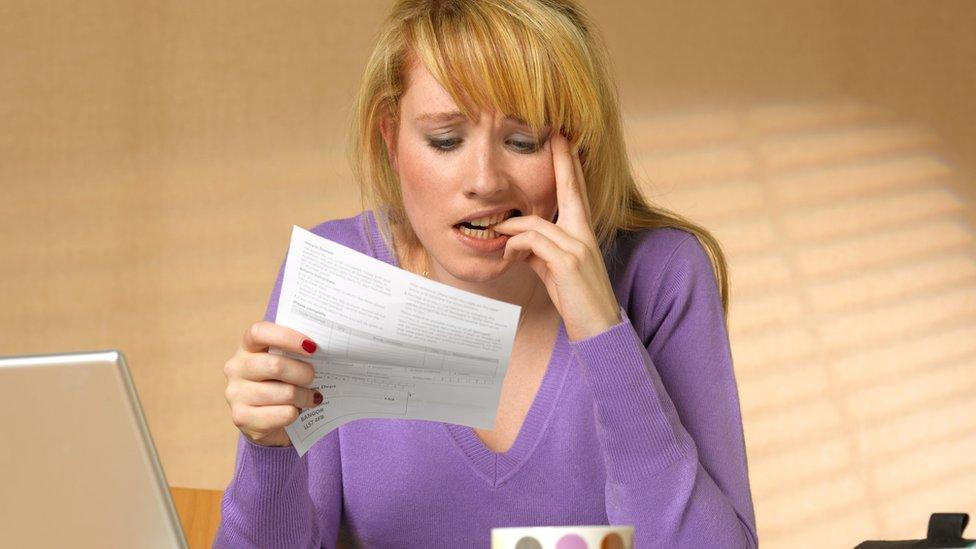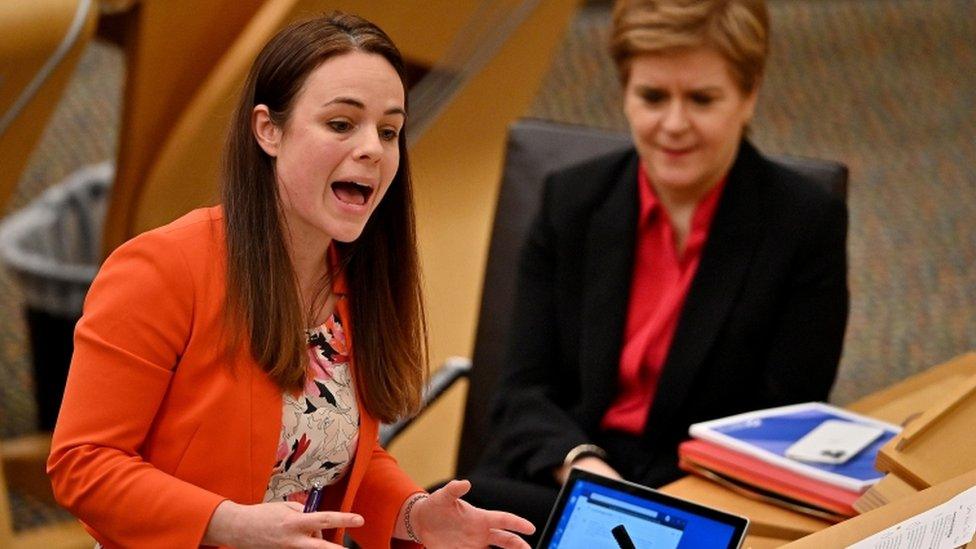Council tax in Scotland: Ending freeze 'will see bills soar'
- Published

Council tax on Scotland has been frozen or capped every year since 2007
Ending the freeze on council tax rises will result in big increases in the amount people have to pay next year, opposition parties have predicted.
The Scottish government announced in its budget that local authorities will be given complete freedom to set council tax rates from next year.
It said it expected them to take account of the impact on household budgets when setting their rates.
But opponents said council tax bills will have to rise to protect services.
Council tax rates have either been frozen completely or capped at 3% since the SNP came to power in 2007.
Finance Secretary Kate Forbes did not explicitly mention the ending of the freeze in her budget speech on Thursday afternoon.
But documents published afterwards said that the government will "provide full flexibility to local authorities in setting council tax rates - enhancing their fiscal autonomy".
What did Ms Forbes say about council funding?
Ms Forbes announced that councils would have an extra £791.4m added to their core budget compared to the current year - a 7% increase.
However, councils point out that much of that money is ring-fenced for social care, including a £10.50 minimum wage, and other national priorities such as expanding teacher numbers.
When other pressures are taken into account they believe local government is facing a £100m budget cut.
They also argue that a £62.6m increase to capital budgets will effectively see them "standing still" because the new cash will need to be spent on Scottish government priorities such as expanding free school meals.
The local government umbrella body, Cosla, said Ms Forbes' budget "does not give local government what we need to survive".

Ms Forbes did not explicitly mention the ending of the council tax freeze in her budget statement
But Mr Forbes told the BBC's Good Morning Scotland programme that she had protected council's core budgets in cash terms while also delivering "real-terms growth to the local government settlement, particularly around social care"
She added: "For many years, Cosla and local governments have been raising with me the need for further flexibilities and discretionary power and we delivered a package yesterday of flexibility that includes council tax.
"I have confidence that local government will do the right thing."
What will it mean for council tax bills?
Councils will not start setting their budgets - including council tax rates - until early next year.
Scottish Labour finance spokesman Daniel Johnson predicted that change to the long-standing freeze meant council tax bills would inevitably rise from April, which he said would "hit people in the pocket".
He said the SNP had "trumpeted" the council tax freeze since introducing it in 2007, but was "now expecting us to celebrate giving councils the ability to raise it".
Mr Johnson said council tax accounted for less than 20% of the total funding for most councils, adding: "Saying that you can raise a very small part of your budget while giving a real-terms cut to the main part of your budget really is quite an empty promise from the SNP."
Scottish Conservative finance spokeswoman Liz Smith said Scotland was already the highest taxed part of the UK, and businesses and local authorities were being asked to "carry the can for SNP mismanagement of the economy".
She said councils had been "short-changed" by the budget, and that people could now expect "very considerable council tax rises from the end of April".
And she said the freezing of income tax thresholds for higher earners in the Scottish government's budget would move 35,000 more people into the higher income tax bracket, which she described as "yet another slap in the face for taxpayers".
Scottish Liberal Democrat leader Alex Cole-Hamilton described council tax as a being "regressive" and "not fit for purpose" and said the Scottish Greens - who are the SNP's partners in government - had previously joined his party in campaigning for the tax to be replaced.
And he said councils had been put in an "armlock" by "swingeing cuts" to their budget, which almost guaranteed that people's council tax bills would "soar" across the country.

The freeze on council tax increases has ended, with councils being given "complete flexibility" to set council tax for 2022/23.
It was not mentioned by the finance secretary in her statement to MSPs but it's there in the small print of the accompanying budget documents.
Several newspapers have concluded that will mean big local tax rises next year. And they could be right.
Although it's worth bearing in mind that next year is an election year with all council seats in Scotland up for grabs in May.
It would take a certain boldness and courage for any administration to introduce big tax increases before an election.
The Scottish government has urged councils to take into account the impact of their decisions on household budgets.
In effect, Kate Forbes is passing on some of the burden of "difficult choices" she described in her budget decision-making to local government.
And she's doing so at a time when local government can be held to account by voters.